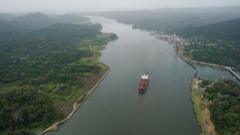The Panama Canal Authority has refuted US claims regarding free transit for government vessels, emphasizing its control over canal tolls as tensions around China's influence escalate.**
Panama Rejects US Allegations of Free Canal Passages for Government Vessels**

Panama Rejects US Allegations of Free Canal Passages for Government Vessels**
The Panama Canal Authority affirms its toll policies following US claims denying charges for government ships, amidst ongoing geopolitical tensions.**
The Panama Canal Authority (ACP) has publicly denied recent claims made by the US government regarding changes to its toll policies for transiting vessels. This statement came in response to assertions from the White House, which stated that US government vessels could now navigate the Panama Canal without incurring any fees, potentially saving millions annually.
The US State Department's announcement on social media prompted the ACP to clarify its position, asserting its authority in setting tolls and fees for the canal, and confirming that no such adjustments had been made. The canal itself, a crucial artery for international trade, stretches for 51 miles across Panama, connecting the Atlantic and Pacific Oceans.
The tensions have escalated due to the remarks from US officials, including Secretary of State Marco Rubio during a recent trip to several Latin American nations. Rubio demanded that Panama implement changes to diminish what he characterized as excessive Chinese influence over the canal's operations. He suggested that failure to comply could lead to a reassessment of US-Panama relations under existing treaties.
Rubio's comments underscore the growing concern among US policymakers regarding geopolitical dynamics, particularly concerning China's increasing presence in global trade routes. US vessels account for a substantial percentage of traffic through the canal, with approximately 52% of transits in 2024 connected to ports in the United States.
The canal, originally constructed by the US in the early 20th century, was subject to a gradual handover to Panama under a treaty signed by President Jimmy Carter in 1977, a decision that former President Donald Trump has criticized as a significant error. President José Raúl Mulino has strongly defended Panama's sovereignty over the canal, rejecting allegations of undue Chinese influence and reaffirming that the administration of this essential trade route remains firmly in Panamanian hands.
The ACP has emphasized its willingness to collaborate with the US navy, highlighting its commitment to optimizing transit prioritization through the canal, fostering a constructive dialogue between the two nations amid the ongoing geopolitical discourse.
The US State Department's announcement on social media prompted the ACP to clarify its position, asserting its authority in setting tolls and fees for the canal, and confirming that no such adjustments had been made. The canal itself, a crucial artery for international trade, stretches for 51 miles across Panama, connecting the Atlantic and Pacific Oceans.
The tensions have escalated due to the remarks from US officials, including Secretary of State Marco Rubio during a recent trip to several Latin American nations. Rubio demanded that Panama implement changes to diminish what he characterized as excessive Chinese influence over the canal's operations. He suggested that failure to comply could lead to a reassessment of US-Panama relations under existing treaties.
Rubio's comments underscore the growing concern among US policymakers regarding geopolitical dynamics, particularly concerning China's increasing presence in global trade routes. US vessels account for a substantial percentage of traffic through the canal, with approximately 52% of transits in 2024 connected to ports in the United States.
The canal, originally constructed by the US in the early 20th century, was subject to a gradual handover to Panama under a treaty signed by President Jimmy Carter in 1977, a decision that former President Donald Trump has criticized as a significant error. President José Raúl Mulino has strongly defended Panama's sovereignty over the canal, rejecting allegations of undue Chinese influence and reaffirming that the administration of this essential trade route remains firmly in Panamanian hands.
The ACP has emphasized its willingness to collaborate with the US navy, highlighting its commitment to optimizing transit prioritization through the canal, fostering a constructive dialogue between the two nations amid the ongoing geopolitical discourse.






















